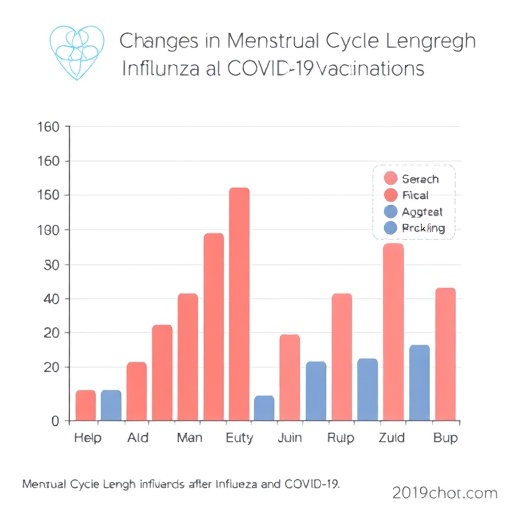A new cohort study has explored the relationship between vaccination — specifically influenza vaccines given alone or alongside COVID-19 vaccines — and changes in menstrual cycle length among individuals with regular menstrual cycles. This comprehensive investigation reveals subtle yet temporary alterations in cycle timing following immunization, providing critical insight into an area of growing clinical and public interest. The findings are poised to inform health professionals and ease vaccine-related concerns regarding menstruation.
Menstrual cycle regularity is a fundamental indicator of reproductive health, governed by complex hormonal interactions within the hypothalamic-pituitary-ovarian axis. Disruptions in this finely tuned system can manifest as shifts in cycle length, flow, or symptomatology. Understanding external influences — including vaccines — on this system is imperative, especially as vaccines have become a focal point of public discourse in recent years.
This study’s methodology involved tracking menstrual cycles among a large cohort of participants with consistent menstrual patterns prior to vaccination. Researchers utilized longitudinal data, allowing comparison of cycle length before and after administration of influenza vaccines alone, as well as in conjunction with COVID-19 vaccines. Such an approach provides a nuanced perspective on transient physiological responses.
Results indicated a modest increase in cycle length immediately following vaccination. Notably, this change was temporary, with cycle lengths generally reverting to baseline in subsequent months. The magnitude of change, while statistically significant, was small and unlikely to have long-term reproductive consequences, thereby underscoring the transient nature of vaccine-induced menstrual alterations.
Immunological responses elicited by vaccines include the activation of the innate and adaptive immune systems, generating inflammatory mediators and cytokines. These immune dynamics can, in theory, interact with endocrine function, potentially influencing menstrual cycle timing. The study extends our understanding by empirically linking these immunological perturbations to mild alterations in menstrual physiology.
Clinicians often encounter patients concerned about the side effects of vaccinations, particularly those related to reproductive health. Given widespread vaccine hesitancy fueled by misinformation, these findings provide evidence-based reassurance. By demonstrating that menstrual changes post-vaccination are temporary and minor, healthcare providers can better counsel patients and mitigate anxiety.
Moreover, the study addresses the intersection of preventive medicine and women’s health by focusing on understudied outcomes of vaccination. It contributes to an emerging body of literature that acknowledges sex-specific responses to medical interventions, emphasizing the importance of inclusive research. Such recognition helps tailor public health strategies that consider gender nuances.
The implications of this research transcend influenza and COVID-19 vaccines, inviting further inquiry into how immunizations might transiently affect other cyclical biological systems. Future investigations may expand on these findings by examining variations across different age groups, vaccine types, and dosing schedules, enhancing our grasp of vaccine safety profiles.
It is also crucial to understand that menstrual cycle variability is influenced by multifactorial determinants including stress, lifestyle, and underlying health conditions. The study carefully controlled for these variables, yet acknowledges the complexity inherent in isolating vaccine effects. This rigorous design strengthens the validity of conclusions drawn.
In addition to the biological considerations, this research holds sociological significance. Menstrual health remains stigmatized, often leading to underreporting and inadequate study of menstrual changes in clinical trials. Highlighting vaccine-related menstrual effects normalizes these experiences, encouraging open dialogue between patients and providers.
From a public health perspective, reassuring evidence regarding vaccine safety in relation to menstrual cycles can improve vaccination uptake. Addressing specific concerns surrounding menstruation may reduce vaccine hesitancy, especially among reproductive-age individuals for whom such issues are highly pertinent.
The integration of menstrual health metrics in vaccine safety assessments represents a paradigm shift toward more comprehensive clinical research. This study exemplifies how prioritizing such measures enriches our understanding of vaccine effects beyond traditional endpoints, ultimately promoting health equity.
Collectively, this investigation underscores that while vaccination may produce slight, short-lived menstrual cycle changes, the benefits of immunization far outweigh these minimal inconveniences. As global vaccination efforts continue, it is imperative that ongoing research and transparent communication sustain public trust through scientifically grounded information.
Subject of Research: Effects of influenza and COVID-19 vaccination on menstrual cycle length
Article Title: (Not provided)
News Publication Date: (Not provided)
Web References: (Not provided)
References: (doi:10.1001/jamanetworkopen.2025.7871)
Keywords: Menstruation, COVID-19 vaccines, Flu vaccines, Cohort studies, Adverse effects, COVID-19, Women’s studies, Gynecological disorders, Vaccination
Tags: cohort study on menstrual cyclesCOVID-19 vaccine impact on menstrual healthhealth professionals and vaccine concernshormonal changes due to vaccinationhormonal interactions and menstruationinfluenza vaccine effects on menstruationlongitudinal study on menstrual patternsmenstrual cycle changes after vaccinationmenstrual cycle regularity post-vaccinationpublic health implications of vaccine-related menstruation changesreproductive health and vaccinestemporary alterations in menstrual cycle





